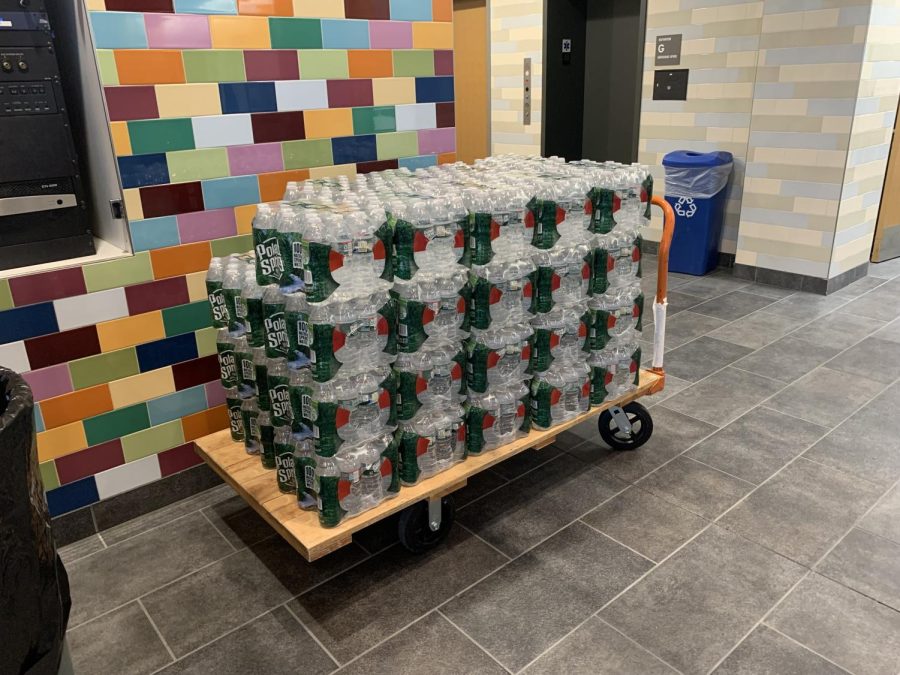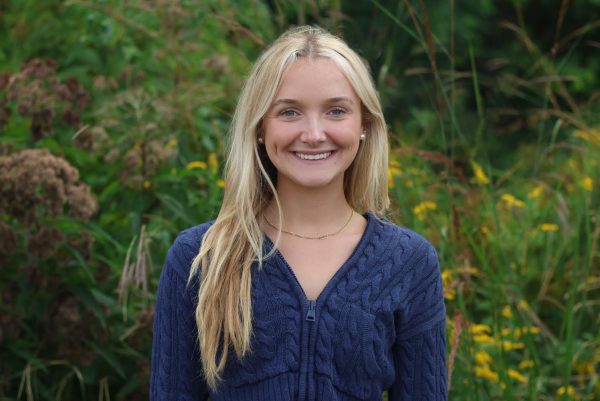Opinion: Contradiction in a bottle
Credit: Talia Macchi
Fifty cases of Poland Spring water bottles get distributed per day at WHS. As a result of the high levels of PFAS in Wayland’s water, the water fountains are unusable. Because of this, plastic water bottles are in use throughout the day, harming many.
January 25, 2022
When we think of water, we think of the ocean, life and the essential nutrients for human survival. However, when we think of plastic, we think of pollution, dying turtles and the destruction of mother earth. So, how is it that the one thing that helps maintain life in the environment can be stored in something that damages both?
As a result of high levels of PFAS in Wayland’s water, Wayland High School continuously distributes packages on packages of ecosystem killing, plastic water bottles. This water issue was supposed to be solved by the third or fourth week of December. The School Committee encouraged students to use reusable water bottles, yet nothing has changed regarding the massive amounts of these toxic bottles around the school.
Students find themselves searching for these costly Poland Spring containers throughout the day. Some students absent-mindedly take one bottle to quench their thirst, but others hoard three or four in their backpacks. Because of this, students are abandoning them on desks, pushing them on floors and squandering them half-full in trash cans.
In my chemistry class, we are learning about air quality and how to reduce pollution, and in my Spanish class, we are learning about the environment and the ways plastic has affected different places around the world. However, the plastic bottles sitting just a couple feet outside the classrooms are not allowing the lessons to thrive. As the bottles have become a convenient solution to the water problem and a part of some students’ routines, it is important that students understand the harm that they are causing on a larger scale.
On average, Wayland distributes 50 cases of 12 packs of water bottles per day. Studies show that for every six plastic water bottles bought, only one is recycled. If that ratio holds true for Wayland, only 100 bottles out of 600 are being recycled and given a new life daily. The others end in landfills, contributing to the increasing rate of pollution in ecosystems and the killing of more than one million animals each year. If these poor recycling trends continue, oceans could potentially contain more plastic than fish by 2050.
Administrators and the School Committee ensured students’ safety from the dangerous water by providing the schools with “safe” water. However, plastic water bottles aren’t doing that justice. Every time you drink from a plastic water bottle, there is a possibility that you are drinking microplastics that are toxic to your health.
What do we drink if both the tap water and bottled water could potentially harm us? Use filtered water! A simple water filter kept in your fridge paired with a reusable water bottle will help all. As it is required for the school to provide water, people should at least do their deed and recycle their empty bottles.
However, I think that WHS should stop buying and distributing plastic bottles altogether. If the water bottles are in the school, students will take them, so the removal of these plastics will allow our community to use a more eco-friendly option. We all are capable of simply obtaining a reusable water bottle, filling it up with clean water and carrying it in our school bags throughout the day. Chair of the School Committee Chris Ryan agrees.
“If we can all work together for the environment to make those plastic water bottles our last resort, I think it would make a really big difference,” Ryan said.
It would make a difference. A small action can make a change. WHS can make a change by stopping the distribution of water-filled plastic. As a community, we are better than this.





![Last Wednesday, the Wayland School Committee gathered to discuss a number of topics regarding the health curriculum and Innovation Career Pathway course. Another large topic of conversation was the ways to potentially mitigate distracting cell phone usage. "These [phones] are going to distract your learning and social relationships," Superintendent David Fleishman said. "That's concrete right there."](https://waylandstudentpress.com/wp-content/uploads/2025/06/Screenshot-2025-06-04-at-9.49.31 PM-1200x886.png)



























![Troy Hoyt finishes the Boston Marathon, running for the Hoyt Foundation. T. Hoyt is the son of Hoyt Foundation CEO Russ Hoyt.
“[Running a marathon] might seem like a big thing, when it’s presented to you at first, but if you break it up and just keep telling yourself, “Yes, you can,” you can start chipping away at it. And before you know it, you’ll be running the whole 26 miles, and you won’t even think twice about it.” T. Hoyt said.](https://waylandstudentpress.com/wp-content/uploads/2025/04/C36E8761-1CBB-452E-9DF2-543EF7B1095E_1_105_c.jpeg)














































Seabert Wang • Jan 26, 2022 at 10:15 PM
Let’s just recycle some more.